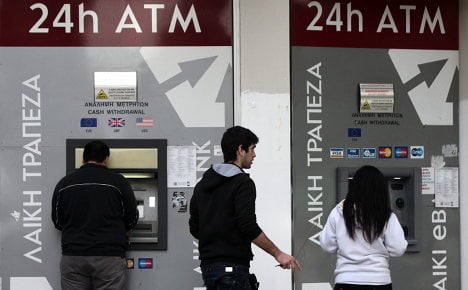“How the country makes its contribution, how it makes the payments, is up to the Cyprus government,” government spokesman Steffen Seibert said, as a finance ministry spokesman added the bailout would have a “largely calming effect” on the eurozone.
The European Central Bank (ECB) opened the door on Monday to possible amendments to a tough EU bailout deal for Cyprus, arguing that as long as the financing secure, it was up to the Cyprus government to decide how to raise it.
“It’s the Cyprus government’s adjustment programme, not the Troika’s or any other government’s,” Germany-based ECB executive board director Jörg Asmussen told a conference here.
The troika is the term used for international creditors, the European Union, the ECB and the International Monetary Fund.
“If Cyprus’s president wants to change something in the structure of the levy on bank deposits, that’s in his hands. He must simply make sure that the financing is intact,” Asmussen said.
Cyprus President Nico Anastasiades is currently seeking the backing of MPs for an EU bailout deal that slaps a tax on bank savings under harsh terms that have jolted global markets and raised fears of a new eurozone debt crisis.
Ahead of a parliamentary vote on the hugely unpopular measure on Monday afternoon, negotiators are seeking to soften the blow on small-time depositors, who have been stunned by the announcement that their savings will be skimmed.
As a condition for a desperately-needed €10 billion bailout for Cyprus, fellow eurozone countries and international creditors Saturday imposed a levy on all deposits in the island’s banks.
Deposits of more than €100,000 will be hit with a 9.9 percent charge, while under that threshold the levy drops to 6.75 percent. The proposal must still be passed by parliament.
Cyprus’s share of the financing of the deal is around €5.8 billion euros.
ECB board member Asmussen insisted it was Nicosia’s programme. “They must decide its parameters. It’s not as if the Troika was adamant about this particular structure,” Asmussen argued.
Cyprus is the fifth eurozone country to turn to its partners for aid, but the first where savers are being asked to foot part of the bill.
The deal sent European stock markets into a tailspin on Monday amid fears of a bank run in Cyprus.
Asmussen said the situation in Cyprus’s banking sector was such that “no easy, risk-free decision was possible.”
The situation in Cyprus was “unique,” he said when asked whether similar conditions could be imposed on other countries seeking a bailout.
AFP/jcw



 Please whitelist us to continue reading.
Please whitelist us to continue reading.
Member comments